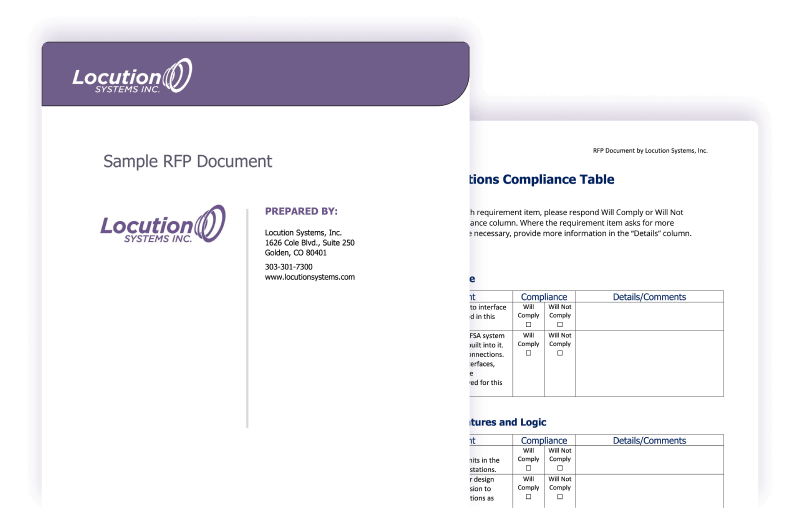Fire Department Grants
Assembling Your FSA Project Team
A Fire Station Alerting (FSA) project can be a significant undertaking. From the initial consideration and request for proposal to the complete installation and activation, it is critical to include key individuals and departments to successfully execute a project of this scale. With over 30 years of experience managing FSA projects, this is Loctuion’s guide to assembling your FSA project dream team.
Important Considerations
Before you begin reaching out to potential team members, it helps to determine the project’s objectives through a technical, political, and purchasing lens.
Good questions to ask yourself:
- Do you want to implement IP alerting?
- Will the system need to be integrated into your CAD?
- Who is in charge of signing off on the budget for department projects?
- Are you going to be upgrading your radio systems?
- Who will be managing/maintaining the system after installation?
- If and when you install station alerting solutions, who will oversee installment?
- Are station alerting tools going into new and old stations? Or just one of the two.
- Will training be required for the new system?
- Who is in charge of defining the needs of the solution?
Although this isn’t an exhaustive list of all questions and considerations, (take a look at our top 10 considerations when shopping for an FSA system), it highlights the diversity of individuals required to buy into and provide insight to see the project through. All FSA projects are unique and adapt to the unique nature of each department, but there are some key individuals that often occupy a spot at the table.
Project Manager AKA Jack of All Trades
Someone will need to be in charge of managing the overall project to help ensure that stakeholders are informed and all deliverables are met in a timely manner. A project manager is helpful due to their high level of technical competency, familiarity with the purchasing process, and ability to effectively navigate political waters to get the project across the finish line.
Dispatch & Fire Station IT
More often than not, there will come a point when the density of the technical jargon exceeds the average employee’s scope of expertise. It is critical to have someone who understands the technical intricacies of your system at both a dispatch center and station level. This individual or individuals — if the fire department and dispatch center IT are different people — is not only necessary to help integrate legacy systems with your new FSA system, but also they will more often than not be responsible for maintaining the system on an ongoing basis once the project goes live.
Relevant Fire Station Leadership
Once you have determined if you are outfitting new and/or old stations with FSA systems, it is critical to include the leadership of those stations and dispatch centers in the discussion. There is no substitute for having someone who works in a station or dispatch center day in and day out to articulate the needs of the staff and ensure those needs are being met.
Purchasing and Fundraising Employees
It’s no surprise that fire departments and dispatch centers operate under tight budgets. Enlisting the help of purchasing and fundraising staff can help you navigate the complexities of city, state, and federal purchasing requirements. Additionally, once an FSA solution is selected, the not-so-simple act of purchasing the system will require a variety of steps that can be completed by these team members.
CAD Specialist
Your computer-aided dispatching system is the heart of your alerting workflow. To successfully install an FSA system, many projects will need to tap into the central CAD system. Although IT teams are essential, they focus on high-level organizational systems for many departments. A CAD specialist knows the intricacies of your computer-aided dispatch system and can be a critical member of the team to help your solution provider integrate their system with yours.
Radio Specialist
Many stations initially built their systems with radio. While some continue to use radio today, it is more often used as a back-up to contemporary IP based alerting systems. Typically, IT teams will be responsible for the IP systems, and sometimes they work on radio as well. If your organizational architecture doesn’t mirror that framework, it is very important to include a member of your radio team on the project. This person can work with your solution provider to help integrate the new alerting system with your existing radio consoles and will be largely responsible for its maintenance moving forward.
Dispatch Center Leadership
Similar to implementing alerting tools into a fire station, installing dispatching tools in a dispatch center has a litany of benefits. It’s critical to include someone heavily involved in dispatch center operations to ensure the dispatchers and the dispatch center are considered throughout the project.
All departments are different — the organizational architecture is as diverse as the communities they protect. We realize the roles shared above may not be exactly the same for your department. Often, larger departments are more siloed, while smaller department staff wear multiple hats. No matter how your department is structured, the key takeaway is to ensure that all departments affected by your FSA project have a representative involved to contribute to a successful configuration and implementation.
Like what you see? Share with a friend.
Related Posts
Subscribe Now
Stay Connected with the First Responder Resource Center
Sign up for the First Responder Resource Center from Locution Systems and gain access to valuable insights, industry updates, and expert resources designed to support first responders. Simply enter your information on the right, and you’ll receive exclusive content, news, and updates straight to your inbox. Stay informed and connected—join today!


